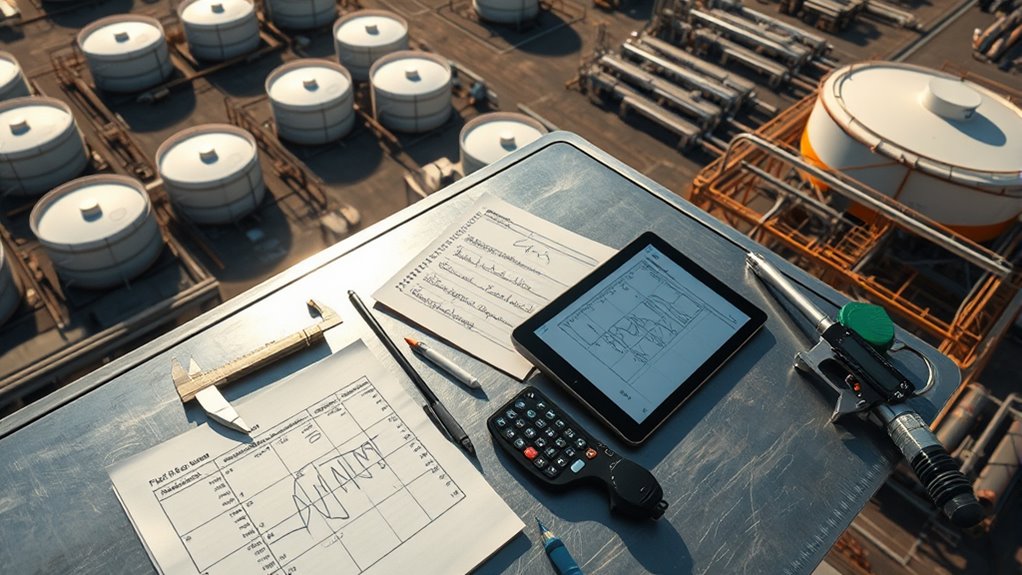To avoid fuel supply issues, you need to focus on accurate calculations. Guarantee your tanks are properly calibrated, and regularly verify measurement tools to reduce errors. Consider fuel density fluctuations caused by temperature and fuel type, and adjust your calculations accordingly. Monitoring storage conditions and maintaining high fuel quality also help prevent shortages or overstocking. Keep these critical factors in mind—if you want to learn more about reliable fuel management, continue exploring this essential checklist.
Key Takeaways
- Regularly calibrate fuel tanks to ensure accurate volume measurements and reduce errors.
- Monitor fuel density variations caused by temperature and fuel type for precise volume-to-weight conversions.
- Maintain consistent fuel quality through testing to prevent contamination and measurement inaccuracies.
- Track filtration system performance and suction power to ensure efficient fuel flow and prevent supply interruptions.
- Update calibration and density data regularly to support reliable fuel consumption calculations and inventory management.
Essential Fuel Consumption Calculations for Reliable Supply Management

To guarantee a steady fuel supply, you need to accurately calculate your fuel consumption. Start with tank calibration to determine the exact volume of your storage tanks. Proper calibration ensures your measurements are precise, reducing errors in fuel volume estimations. Next, consider fuel density, which can vary depending on temperature and fuel type. Knowing the correct fuel density allows you to convert volume measurements into weight accurately, essential for cost and inventory calculations. Regularly calibrate your tanks and update fuel density data to maintain reliable estimates. Additionally, understanding Suction power and filtration systems can help assess fuel filter performance and lifespan, ensuring smooth operation. This combination helps you track fuel usage precisely, avoid shortages, and optimize procurement. Accurate fuel consumption calculations are fundamental for effective supply management, ensuring you always have enough fuel without overstocking or underestimating your needs.
Critical Factors for Accurate Fuel Volume and Cost Estimations

Accurate fuel volume and cost estimations hinge on several critical factors that must be carefully managed. Proper tank calibration ensures measurements reflect actual fuel volume, preventing costly errors. Fuel quality impacts density and energy content, influencing volume calculations and efficiency estimates. Regular calibration checks and quality assessments are essential for precision. Use the table below to track these factors:
| Factor | Key Consideration |
|---|---|
| Tank Calibration | Regularly verify with calibration tools |
| Fuel Quality | Test for contaminants and consistency |
| Measurement Tools | Use precise, calibrated equipment |
| Fuel Density | Adjust calculations based on density |
| Storage Conditions | Maintain stable temperature and environment |
Focusing on these factors guarantees more reliable fuel volume and cost estimates, reducing errors and optimizing supply management. Additionally, monitoring measurement accuracy ensures that your readings remain dependable over time.
Frequently Asked Questions
How Do Seasonal Changes Affect Fuel Consumption Estimates?
Seasonal fluctuations notably impact your fuel consumption estimates due to weather impact and changing temperatures. In colder months, you’ll likely use more fuel for heating and vehicle operation, while warmer months may reduce that need. To stay accurate, adjust your calculations regularly based on seasonal trends, account for increased demand during peak seasons, and monitor weather patterns. This proactive approach helps you avoid shortages and manage your fuel supply efficiently year-round.
What Are Common Errors in Fuel Volume Measurement?
You could easily misjudge fuel volume if you overlook common errors like ignoring fuel density variations or neglecting measurement calibration. These slip-ups can cause your readings to be way off, like missing a mountain in a fog. Always double-check calibration tools and consider fuel density changes due to temperature. Accurate measurements depend on precise calibration and accounting for fuel properties, so don’t let small mistakes snowball into big problems.
How to Account for Fuel Evaporation Losses?
You should account for fuel evaporation losses by implementing vapor recovery systems in your storage tanks, which capture vapors before they escape. Regularly monitor vapor recovery efficiency and perform calculations to estimate evaporation rates based on temperature, tank volume, and vapor pressure. This way, you can adjust your fuel volume measurements accurately, ensuring you don’t underestimate losses and maintain precise inventory control.
Which Tools Improve Accuracy in Fuel Cost Calculations?
Imagine a calculator that sharpens your view of fluctuating fuel prices and quality standards. Using specialized software and real-time data analysis tools lets you track fuel price trends precisely, ensuring your calculations reflect current market conditions. These tools improve accuracy by automatically adjusting for quality standards and evaporation losses, giving you a clearer picture of your fuel costs. With them, you gain confidence in your budgeting and decision-making processes.
How Do Geopolitical Events Impact Fuel Supply Forecasts?
Geopolitical risks directly impact your fuel supply forecasts by causing supply chain disruptions, which can lead to shortages or price spikes. When tensions rise or conflicts occur, you might see decreased production or transportation delays, making it harder to predict fuel availability accurately. To stay ahead, monitor geopolitical developments closely, factor in potential disruptions, and update your forecasts regularly to adapt to changing risks.
Conclusion
By mastering these key fuel calculations, you’ll guarantee a reliable supply and avoid costly shortages. Did you know that incorrect fuel volume estimates can lead to over 30% wastage? Staying diligent with these checks keeps your operations efficient and cost-effective. Remember, accurate calculations are the backbone of smooth fuel management—don’t skip them, and you’ll stay ahead of potential issues. Keep these tips in mind to maintain a steady, dependable fuel supply.









